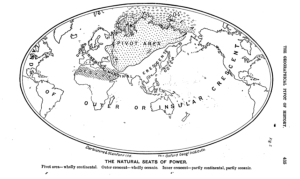Eurasianism (Russian: евразийство, yevraziystvo) is a socio-political movement in Russia that emerged in the early 20th century which states that Russia does not belong in the "European" or "Asian" categories but instead to the geopolitical concept of Eurasia governed by the "Russian world" (Russian: Русский мир), forming an ostensibly standalone Russian civilization of which both contains elements of European and Asian civilization.
Geopolitical basis
Eurasianism draws heavily on 20th century Geopolitical doctrine. In particular that of Halford Mackinder, whose famous 1904 paper, "The Geographical Pivot of History," has been formative for geopolitical theorists from Zbigniew Brzezinski to Alexander Dugin. His paper was a landmark in conceiving geography in its relation to history, and examined the importance of the Eurasian Steppe in particular. In the context of Alfred-Thayer Mahan's The Influence of Sea Power Upon History, (1890) then at the height of its popularity, his paper could be seen as a response to over-hyped Anglos who thought they could rule the world from the waves alone. He writes about the great potential for railroads to crisscross Eurasia, rendering sea-shipping superfluous.
Who rules East Europe commands the Heartland: Who rules the Heartland commands the World Island: Who rules the World Island commands the world.[1]
